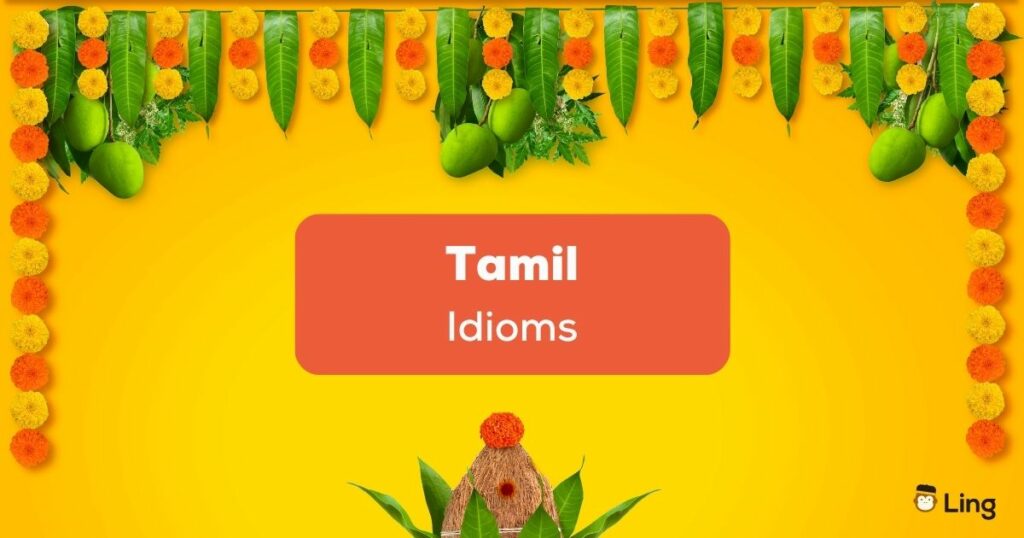Ever been scolded by a Tamilian Pāṭṭi (grandmother) for behaving too big for your boots? I can bet my life’s savings that you would have been thrown some Tamil idioms with a dramatic eyebrow raise as she goes about saying something similar in Tamil: Muḷaiccu mūṉu ilai kūṭa viṭala! Well, you can learn some of these Tamil idioms yourself to have a counter-answer ready. But you better do it at your own risk!
Though seriously speaking, learning Tamil idioms can help improve your understanding of the language and your fluency in speaking it. Idioms and proverbs add a lot of character and nuance to your expression. Not only that, they almost always reflect your prowess and proficiency in the language. These linguistic tools are a creative way of succinctly putting words into your thoughts. You can use these terms to precisely sum up what reams and pages of the written word can’t.
Ready to learn more? Keep reading below!
Tamil Idioms: A Peek Into The Tamil World
Idioms and proverbs are also brilliant sources of gaining insight into people and their culture. For instance, Tamil people are considered to be reserved. The general perception is that they keep to themselves and don’t give much to fun and frivolity. Another interesting fact is that Tamil people don’t ever talk about death in direct terms and always use euphemisms to convey it. Some of the Tamil idioms and Tamil proverbs reflect these insights to the T! So, let’s go over some and add these linguistic weapons to our armory.
#1 Muḷaiccu mūṉu ilai kūṭa viṭala (முளைச்சு மூனு இலை கூட விடல)
Literal: (You are) yet to develop even three leaves since (you) sprouted.
Meaning in English: It is a somewhat similar translation of the English idiom ‘too big for your boots.’ It is usually used in the context of reminding someone of their actual status. For example, when a child acts too independent while still being minor and dependent.

#2 Kalyāṇam eṉpatu āyiram kālattu payir (கல்யாணம் என்பது ஆயிரம் காலத்து பயிர்)
Literal: Marriage is a thousand-year crop.
Meaning in English: Marriage is a serious commitment. So, think long and hard before making this important decision in your life.
#3 Akala kāl vaikkātē (அகல கால் வைக்காதே)
Literal: Don’t keep your feet wide (apart).
Meaning in English: Don’t strive too hard for something beyond your capacity. In other words, stick to your strengths.
#4 Caṅku ūtiṭṭāṅka (சங்கு ஊதிட்டாங்க)
Literal: Blow the conch.
Meaning in English: In the literal sense, this idiom refers to the practice of blowing a conch shell to mark the onset of war, the act of killing. The implied meaning here is to destroy someone or raze them to the ground, just like after a war.
#5 Pōy cēntuṭṭār (போய் சேந்துட்டார்)
Literal: He went away.
Meaning in English: This idiom is spoken to convey the passing away of someone.

#6 Eṉakku ēṟkaṉavē kātu kuttiyāccu (எனக்கு ஏற்கனவே காது குத்தியாச்சு)
Literal: I already have my ears pierced.
Meaning in English: In Indian culture, ear piercing is a ritual done when the child is young. So, the implied meaning here is that one is not so young or naive anymore to get easily deceived.
#7 Avaṉait taṇṇīr teḷittu viṭṭu viṭṭēṉ (அவனைத் தண்ணீர் தெளித்து விட்டு விட்டேன்)
Literal: I sprinkled him with water and left him.
Meaning in English: I gave up on him.
#8 Avar iyaṟkai eytiṉār (அவர் இயற்கை எய்தினார்)
Literal: He/she became one with nature.
Meaning in English: In Tamilian culture, people generally deploy various euphemisms to convey death. Moreover, In Indian culture, it is believed that our physical body is made up of the five elements from nature – air, water, earth, fire, and space – and upon death, it merges back into nature.
#9 Avaṉ kampi nīṭṭi viṭṭāṉ (அவன் கம்பி நீட்டி விட்டான்)
Literal: He held out the wire/rod.
Meaning in English: This Tamil idiom is spoken in the context of facing fraud. Here, wire or rods can be seen as those in a prison cell. So, the man succeeded in escaping the prison by making a gap between the rods. The implied meaning is that the man escaped after committing fraud or swindling money.
#10 Aṭutta teruvil oru paccai maṭṭai viḻuntirukkiṟatu (அடுத்த தெருவில் ஒரு பச்சை மட்டை விழுந்திருக்கிறது)
Literal: A green coconut leaf has fallen on the next street.
Meaning in English: Once again, a euphemism for death. Since healthy green leaves don’t fall off independently, this Tamil idiom implies they have been cut off purposely. In Tamil culture, the dead bodies are carried to the cremation ground on something called a Pāṭai (பாடை) – a stretcher-like structure made of bamboo and coconut leaves.

Let’s Learn Tamil With Ling
Did you have fun learning these Tamil idioms and Tamil proverbs? There is so much more to the Tamil language that you can discover and learn quickly in Ling. Not only do we have helpful blogs on trending topics and listicles on language learning, but we also cater to your linguistic curiosity via our gamified app.
The Ling app is one of the best language-learning tools, with its gamified interface, interactive exercises, exclusive chatbot, in-depth lesson guides, and fun quizzes. Trust me that you are bound to make quick progress without paying an exorbitant price if you use Ling regularly for at least 10 minutes a day. So, what are you waiting for? Go to your Google Play Store or Apple App Store and download the Ling App for FREE now to start learning Tamil and 60+ other languages!

































































